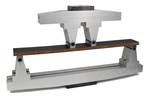New standard specification supports non-metallic FRP rebar
ASTM International standard D8505 enables further integration of FRP rebar into infrastructure applications.
Photo Credit: Getty Images
’s (Conshohocken, Pa., U.S.) composite materials committee () has developed a new standard specification for the latest generation of fiber-reinforced polymer (FRP) rebar.
FRP rebar is used as internal concrete reinforcement. According to ASTM International member Francisco De Caso, this new standard (D8505) is a milestone after several decades of collaboration to further integrate these composite materials into infrastructure.
“The higher performance specified for bars, results in a significant improvement of design and construction of concrete structures reinforced with non-metallic FRP bars,” says De Caso, principal scientist at the University of Miami (Fla., U.S.). “This translates into more efficient and sustainable design of concrete structures.“
De Caso notes that the specification contains critical contributions such as the inclusion of basalt fiber-reinforced rebar to existing glass fiber-reinforced rebar, as well as higher-performance rebar. He also says that the standard could be useful across the concrete construction value chain.
This effort directly relates to United Nations Sustainable Development Goals #6, 9, 11 and 12 on clean water and sanitation, industry, sustainable cities and responsible production/consumption, respectively.
Also read about “… standard related to bolted joint properties,” “...inspection of FRP building repairs” and “...plastic piping systems standard to aid fluid and gas transport.”
Related Content
-
SGL Carbon carbon fiber enables German road bridge milestone
A 64-meter road bridge installed with carbon fiber reinforcement is said to feature a first in modern European bridge construction, in addition to reducing construction costs and CO2 emissions.
-
Fiber Elements raises €2.6 million seed funding for 3D basalt fiber
The company’s approach combines FEA with advanced manufacturing processes to create mineral composites that are 3X stronger than steel while weighing two-thirds less, aiming to replace steel reinforcement in construction.
-
R-Tech Materials offers accredited composite rebar testing
The independent U.K. lab has has developed a comprehensive suite of materials testing capabilities tailored to the growing demands of the construction sector.






